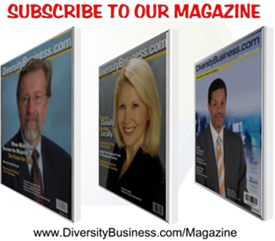 |
All rights reserved.
 Print this Article Print this Article
 Email this Article Email this Article
 Submit a Story Submit a Story
 Purchase/License Purchase/License
 More Articles More Articles
|
|
|
The Tao of 2.0 - Why Small Really is Beautiful for Entrepreneurs: By Jerry Bowles
|
SOUTHPORT, CT –/ -- DiversityBusiness.com /- One of the books that has had the most lasting influence on my thinking (and that of many other people) over the years is the late British statistitican and pioneering environmentalist E.F. Schumacher’s Small is Beautiful: Economics As If People Mattered. Fritz, as he was known to his friends, had been a protege of John Maynard Keynes but somewhere along the line he began questioning whether an economic system could be sustainable over the long haul if it measured human well-being only in terms of production and consumption. He also questioned the wisdom of taking for granted the existence of limitless resources in a finite world or depending on nature alone to cope with pollution. Schmacher had brilliant insights on a seemingly limitless range of issues–including Buddhist Economics–but it is his ideas on technology that have stuck with me most over the years.
 The collection of essays that was published in 1973 as Small is Beautiful introduced the concept of “appropriate” or “intermediate” technology, which is a level of technology more productive and effective than that employed traditionally in rural areas but simpler and less capital intensive than Western technologies. Schumacher envisioned it as technology that was somewhere midway between a hand hoe and a tractor. Tractors and other modern farm vehicles break down and usually can’t be repaired locally which means that at a certain point they will be abandoned and the locals will be back where they started. Far better, Schmacher believed, to give them a small, easily repairable engine that used little fuel and could be adapted to many community uses. The collection of essays that was published in 1973 as Small is Beautiful introduced the concept of “appropriate” or “intermediate” technology, which is a level of technology more productive and effective than that employed traditionally in rural areas but simpler and less capital intensive than Western technologies. Schumacher envisioned it as technology that was somewhere midway between a hand hoe and a tractor. Tractors and other modern farm vehicles break down and usually can’t be repaired locally which means that at a certain point they will be abandoned and the locals will be back where they started. Far better, Schmacher believed, to give them a small, easily repairable engine that used little fuel and could be adapted to many community uses.
“Ever bigger machines, entailing ever bigger concentrations of economic power and exerting ever greater violence against the environment, do not represent progress: they are a denial of wisdom,” Schumacher wrote. “Wisdom demands a new orientation of science and technology towards the organic, the gentle, the non-violent, the elegant and beautiful.”
For Schumacher, “elegant simplicity” was not only the most direct and practical solution to most problems but a matter of morality and a path to spirtuality. “Man is small, and, therefore, small is beautiful,” he wrote. Our basic needs are simple; it’s our wants that lead to excesses.
I leave it to others to consider what kind of dangerous lunatic Schumacher might be considered were he alive in our current age of political pygmies, but I can’t help wondering how he might regard personal computers, the internet, and the information infrastructure–the main artery of modern capitalism–that has developed over the past 30 years or so since his death.
 Manuel Castells, another dangerous madman, has written extensively about the economic gap between the wired and the digitally dispossessed and I suspect Schumacher would agree with most of it. But, the ideas that link Web 2.0 and the new web-delivered small apps to Schumacher are elegant simplicity and intermediate technology. Manuel Castells, another dangerous madman, has written extensively about the economic gap between the wired and the digitally dispossessed and I suspect Schumacher would agree with most of it. But, the ideas that link Web 2.0 and the new web-delivered small apps to Schumacher are elegant simplicity and intermediate technology.
Keep It Simple, Stupid
Elegant and simple are not the way we Americans build things. We are just-in-case guys and gals. Why have enough nuclear weapons to blow up the world a hundred times when you can make enough to blow it up a thousand times?
Since the arrival of the PC, the emphasis has been on building ever-more-powerful operating systems to support ever-more-powerful and space-consuming applications. In the earliest years of the PC, say 10 years ago, that made sense since each computer was a self-contained unit. Consumers and businesses upgraded every few years but software vendors kept adding features so the net gain in speed and storage capacity was minimal. And, frankly, most of the new features were overkill and never used by the overwhelming majority of users. (When is the last time you formatted a large document with headers and footers and all the frills?) The net result is that most office and home PCs are now bogged down by a nest of complex, bloated programs that are rarely if ever used. This is wasteful and inefficient and–now that most computers are networked–increasingly unnecessary.
Led by Google and dozens of other makers of online small business ‘tools,’ entrepreneurs around the world now have access to free web-based applications—calendars, spreadsheets, word processors, design tools—that cost hundreds of dollars if you bought their proprietary counterparts from Microsoft and Adobe. The beauty of web-delivered small apps is that they provide users with precisely the information or tool they need at precisely the moment it is needed. No more. No less. They are “appropriate.” Small web-delivered apps plus thin clients are a simple and elegant solution to much of the ugly complexity of today’s computing infrastructure.
Thinking Intermediate
Small apps also offer developing countries an opportunity to leapfrog into advanced computing by skipping the whole self-contained, overloaded PC phase. American and Western European governments and businesses have enormous investments in existing PCs and software technology that will all need to be replaced eventually. Poorer countries generally lag several years behind developed countries in technology which can prove to be an economic advantage. China, for example, simply jumped over 100 years of copper-in-the-ground telephone development, and straight into 21st century wireless. Web 2.0 technologies offer the same promise. They are what Schumacher envisioned as “intermediate technology,” somewhere between a hoe and a tractor and right now anyone with an internet connection can download a functioning suite of office tools free.
Web 2.0 technologies are not going to lift an African village out of poverty or make the world safe for the American brand of democracy but they do have the potential to liberate computing from the largely unchallenged assumption that bigger and more powerful is necessarily better and more efficient. They can level the playing field for businesses in emerging countries and create healthier economies which benefit everyone. They are a promising path toward a world that embraces economics as if people mattered. They are small and beautiful.
About DiversityBusiness.com
Launched in 1999, DiversityBusiness, with over 50,000 members, is the largest organization of diversity owned businesses throughout the United States that provide goods and services to Fortune 1000 companies, government agencies, and colleges and universities. DiversityBusiness provides research and data collection services for diversity including the "Top 50 Organizations for Multicultural Business Opportunities", "Top 500 Diversity Owned Companies in America", and others. Its research has been recognized and published by Forbes Magazine, Business Week and thousands of other print and internet publications. The site has gained national recognition and has won numerous awards for its content and design. DiversityBusiness reaches more diverse suppliers and communicates more information to them on a more frequent basis then all other organizations combined. We also communicate with mainstream businesses, government agencies and educational institutions with information related to diversity. Our magazine reaches over 300,000 readers, a monthly e-newsletter that reaches 2.4 million, and website visitors of 1.2 million a month. It is a leading provider of Supplier Diversity management tools and has the most widely distributed Diversity magazine in the United States. DiversityBusiness.com is produced by Computer Consulting Associates International Inc. (CCAii.com) of Southport, CT. Founded in 1980.
|
|
All rights reserved.
 Print this Article Print this Article
 Email this Article Email this Article
 Submit a Story Submit a Story
 Purchase/License Purchase/License
 More Articles More Articles
|
| |
|
 |
|

